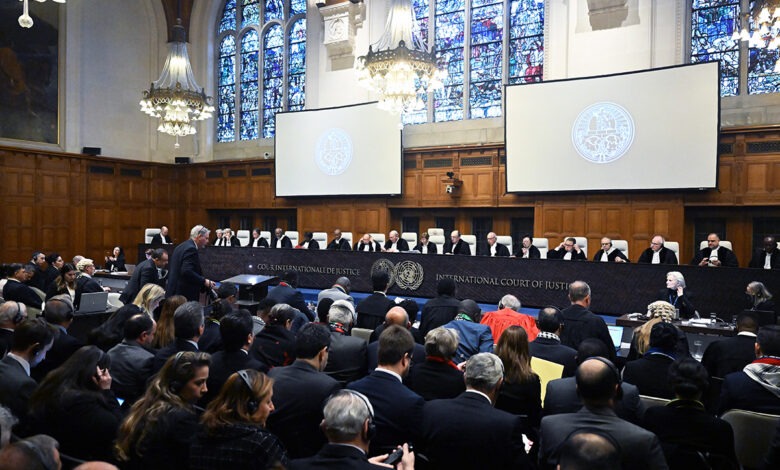The world is eagerly awaiting the ICJ’s urgent ruling

 By Tareq Yousef AlShumaimry
By Tareq Yousef AlShumaimry
On 12 January 2024, the International Court of Justice (ICJ) concluded its first hearing in the case South Africa v. Israel, in which South Africa accused Israel of intending to commit genocide against Palestinians in Gaza.
In a quick response, the International Court of Justice announced that on January 26, 2024, it will issue its ruling on provisional measures in the urgent part of the case.
By analyzing the case and considering the challenges and opportunities for success facing South Africa in its case before the ICJ, the following becomes clear:
First: In issuing orders and temporary precautionary measures, the court does not require consideration of the merits of the case, or evaluation of the evidence presented. Rather, it only considers the case papers if there is an emergency circumstance or event that will lead to damage that cannot be remedied and requires urgent temporary measures that cannot tolerate delay. As for South Africa’s request, the suspicion that Israel has committed the crime of genocide against the Palestinian people in the Gaza Strip is sufficient to fulfill the condition for the court to accept the request to issue a temporary precautionary order. Suspicion currently exists in light of the atrocities committed by Israel in the Gaza Strip, which result in serious humanitarian damage that cannot be remedied without taking urgent measures.
Second: South Africa also submitted to the court a set of urgent requests, the most important of which was the demand for an immediate cessation and suspension of Israeli military operations in the Gaza Strip. However, the package also included a request that the court order an order to stop Israeli military operations in the Gaza Strip and order the Israeli government not to incite directly.
And that the crimes of genocide have been committed, that Israel will hold accountable members of the Israeli government who do so, that Israel will take all necessary measures to rescind government decisions related to preventing and depriving Palestinians in the Gaza Strip of access to food, and that the Court orders Israel to take precautionary measures to prevent the destruction of its military evidence and to retain this evidence to present it to the court, and for Israel to submit periodic reports on the measures taken to comply with precautionary measures, and to refrain from taking measures that would further aggravate the conflict.
With the exception of the request for an immediate cessation of military operations, the requests made by South Africa will not face legal challenges because most of them are reasonable and proportionate to the circumstances and seriousness of the event.
Third: With regard to the Israeli request for an immediate cessation of all its military operations in the Gaza Strip, South Africa may face some legal challenges regarding determining the nature of the temporary measure and drafting the executive part of this request, as South Africa’s request was general in its wording – “all of its military operations.” It may be difficult for the Court to fully respond to this request because it is inconsistent with Israel’s right to defend itself, and since even if some of Israel’s actions are considered unlawful because they bear the character of genocide, other actions may be legitimate from the Court’s point of view.
From the point of view of international law, such as stopping the firing of missiles directed at Israel and trying to reach Israeli hostages or targeting some members of Hamas in particular. Therefore, saying to stop all military operations carried out by Israel may be considered a request that includes an increase or exaggeration and a departure from the scope of application of the Genocide Convention to the extent of compromising Israel’s legitimate right to defend itself, according to Israel’s claim.
Accordingly, it is expected that a disagreement may arise between the judges of the Court regarding the wording of the temporary executive order, as the Court may follow suit in the case of Bosnia v. Yugoslavia (Serbia and Montenegro), in which the Court refrained from issuing a precautionary order to halt military operations carried out by Serbia. Exactly, when drafting the operative word, it was limited to obliging Serbia to take the necessary measures to prevent the commission of the crime of genocide, without mentioning military operations or stopping aggression in general.
The time period for issuing a temporary precautionary ruling
Regarding the time period for issuing the precautionary ruling, the International Court of Justice announced that on 26 January, they will deliver his order on the request to indicate provisional measures.
The provisional order is usually implemented over a period ranging from weeks to months. In the Bosnia case, for example, the court’s decision came three weeks after Bosnia submitted the urgent application and less than a week after hearing oral argument on the application. As for the Gambia case, the court’s decision on precautionary measures came about two months after Gambia submitted its request (but only about one month after the pleading sessions for this request). In the case brought by Canada and the Netherlands against Syria regarding torture, the court’s decision on precautionary measures came more than five months after the request was submitted (but only about one month after the plea hearings for the request).
In the ongoing case between Ukraine and Russia, the court’s decision on precautionary measures came about a month after Ukraine submitted the request, and after about two weeks of public hearings. Regarding the subject of the dispute, I believe that the lawsuit is not devoid of legal challenges that will necessarily be faced by both parties:
First: For South Africa, proving the commission of the crime of genocide is not without challenges, as international law requires proof of a clear and specific intent to destroy an entire group or part of it belonging to a specific race, religion, or ethnicity.
In its claim, South Africa described the Israeli aggression as “bearing the character of genocide.” Because it aims to achieve the destruction of a large portion of the Palestinians, specifically the Palestinians living in the Gaza Strip. As evidence of genocidal intent, South Africa cited Israel’s deliberate killing of Palestinian civilians in Gaza, inflicting serious physical and psychological harm on them, and deliberately creating special living conditions aimed at their physical destruction, such as isolating them and depriving them of water and medicine. fuel, shelter and other humanitarian aid.
Repeated statements made by representatives of the Israeli government, including the Prime Minister, Defense Minister and President, are evidence of genocidal intent, but this evidence can be refuted and portrayed as a reaction to the attack carried out by Hamas on October 7, 2023, and that Israel would not have done all that. Were it not for this attack, and the siege imposed on Gaza since then, the Israeli withdrawal is only a precautionary measure to prevent resistance operations from reaching deep into Israel.
Therefore, the Israeli military operations, despite their brutality, may not rise to the level of genocide according to some legal opinions, as they classified them as illegal or illegitimate aggression because they are not proportional to the scale of the attack launched by Hamas on October 7, 2023, and are not described as a crime of genocide. Hence South Africa may face some legal difficulties in comprehensively and conclusively proving the existence of extermination intent.
Second: For Israel, this lawsuit will open the way to delve into some legal and historical issues that Israel has tried to avoid delving into for decades. While South Africa’s claim focuses on Israel’s actions since October 7, 2023, the prosecution paper skillfully included – the Palestinian issue in general and the broader context of Israel’s behavior towards the Palestinians during its 75-year apartheid rule, its illegal occupation of Palestinian territories since 1956, and its blockade of the Gaza Strip that it lasted 16 years.
Therefore, deciding this issue will necessarily require consideration of some thorny and embarrassing legal issues for Israel, such as whether Palestine is a state and, from a legal standpoint, whether Hamas can be considered a representative of Palestine in the Gaza Strip, and whether Israel has the necessary authority and right to defense. itself against an entity that is not considered a state, and whether Gaza is still occupied territory from a legal point of view.
For example, customary international law only recognizes self-defense against sovereign states, and therefore the current Israeli aggression against the Gaza Strip cannot be justified as self-defense in the traditional sense of international law because Israel does not recognize Palestine as an independent state.
Therefore, Israel’s self-defense can only be taken into consideration in the context of the rules of international law of occupation, and if the issue of self-defense is examined from this perspective, the court will necessarily address the issue of Israel’s siege of the West Bank and Gaza Strip and its legal settlement and this siege (as an actual occupation).
The extent of its legitimacy and its causal relationship to the attack carried out by the Hamas movement on October 7, 2023, are all issues that Israel has denied for a long time through its media discourse that manipulates language, politics, and uncontrolled terminology, but this lawsuit will put an end to this undisciplined policy and will issue the binding international judicial ruling, not only in its form ( Regardless of the outcome of the ruling, but it is also binding in its reasons and circumstances).

Tareq Yousef AlShumaimry, served as Chairman of the Finance Committee and Chairman of the General Budget Committee of the Permanent Court of Arbitration in The Hague (PCA) and an observer in the Administrative Council of the Court and the Consular at International Court of Justice (ICJ) and the Embassy of the State of Kuwait in the Netherlands during this period from 2013 to 2020.
Email: tareq@alshumaimry.com













